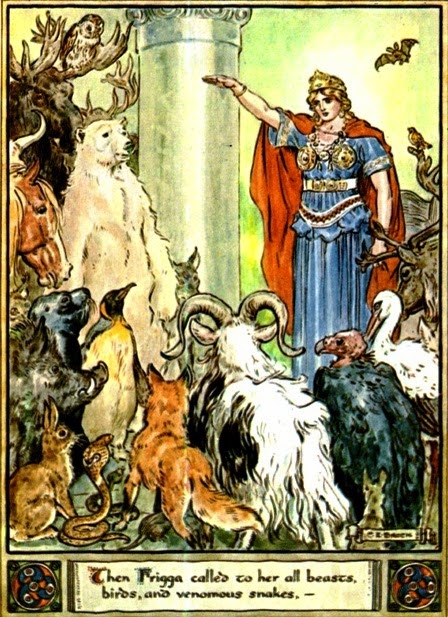Loki straightaway made a spear from the mistletoe and convinced the blind god, Hodur, to throw it at Baldur. The projectile, guided by Loki's aim, pierced the god and he fell down dead.
The anguished Odin sent another one of his sons, Hermod, to the underworld to see if there was any way Baldur could be retrieved from the clutches of the death goddess, Hel.
And so the bright god lay in the grave until Ragnarok (the end of the world) when he will be returned at last to the land of the living, gladdening the hearts of the creatures who fill the new world.
By the way, the engineering of Baldur's death was the final straw for Loki, but that is a story for another day.
Next Thor's Day: The blind god, Hodur
Labels: Aesir , Baldur , Hel , Hermod , Hodur , Loki , Norse myth , Thor's Day
It's Thor's Day once again and that means some more trivia about the Norse pantheon.
Forseti (FOR-set-tee) is the Norse god of justice and mediation. Forseti is a grandson of Odin so he is a member of the newer class of gods known as the Aesir.
Forseti is one of the “younger” gods of the Norse pantheon, and it is telling that he is the son of one of the most famous murder victims in its history (Forseti's father, Baldur, was killed in a plot orchestrated by the trickster god, Loki).
Unlike the older gods, who embraced vengeance, Forseti turned to fair mediation in spite of his family history.
As a lawmaker, he approaches wrongdoing as a complex, multilayered problem that requires humane solutions based on established laws rather than lashing out emotionally.
Folk of all kinds would come to him for mediation of their problems, and it was said that no one came away dissatisfied by Forseti’s judgments.
Next Thor's Day: Forseti's father, Baldur
Labels: Aesir , Forseti , Norse myth , Thor's Day








